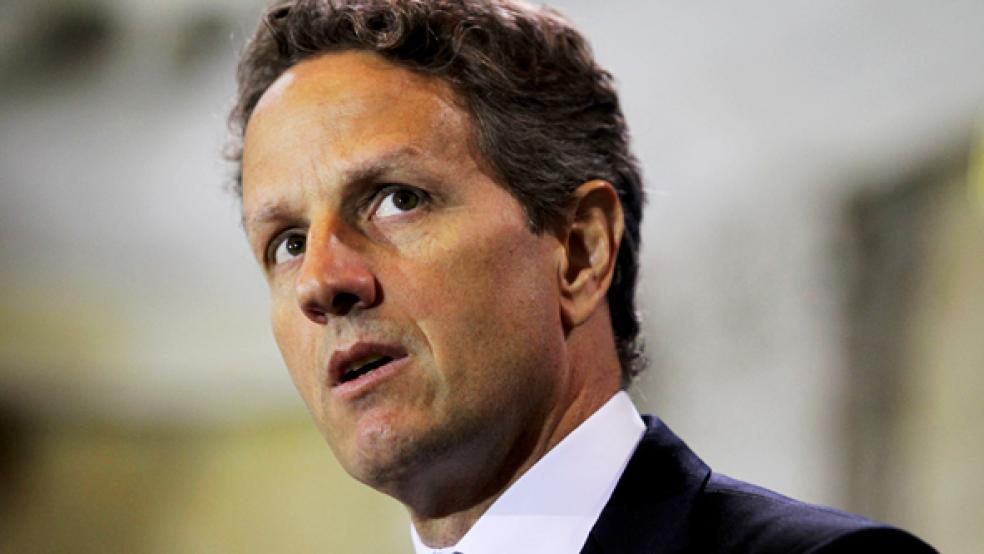Former Treasury Secretary Timothy Geithner said Monday that bailing out major financial institutions during the financial crisis was the “moral thing to do” in order to protect the broader economy from massive unemployment and a further deterioration of public trust in the financial markets.
Geithner was back in Washington to promote his memoir, Stress Test, which was published last week. He was interviewed by Politico’s chief White House correspondent Mike Allen and chief economic correspondent Ben White.
Related: Geithner’s Insult ‘A Badge of Honor’ – TARP Top Cop
Asked about the impression held by much of the public that the government response to the financial crisis – particularly the Troubled Asset Relief Program put in place by the Bush administration – paid too much attention to banks and not enough to struggling homeowners, Geithner disagreed.
“I think it’s important to start with the recognition that this was a classic financial panic,” Geithner said.
“In that context, the only way to protect people from mass unemployment is to step in and try to prevent the collapse or failure of the financial system. That’s the essential, necessary, moral thing to do. Nothing is possible if you don’t do that,” he said.
He continued with an analogy: “You’re in a plane, in a cockpit, and the plane’s on fire. There’s a bunch of people going to die if you don’t land that plane safely. People wants you to come out of the cockpit. Could you negotiate conditions on the banks before you land it? Could you figure out what caused the plane to be on fire at that moment? Or are you going to go land the plane?
Related: Geithner Book Settles Scores, Defends Policies
“That was our obligation; that’s what we tried to do. And it was messy, it was very damaging, because the panic at that point had so much momentum, but that was the first obligation.”
But while saving the banks was necessary and achievable, Geithner said, saving underwater homeowners was not.
“Housing was tragic, terribly hard, very disappointing to all of us,” he said. “Nothing we did on housing had as much traction, as much benefit, as much power, as people deserved. The scale of the problem was just massive relative to the tools and the authority.”
Geithner did not point out that, years into the crisis, the Treasury had failed to spend even 10 percent of the funds allocated to help struggling homeowners.
Related: Geithner Memoir to Connect Dots of Financial Crisis
White asked why there had been no effort to create a $700 billion fund – comparable to the amount of funding authorized for TARP – to help homeowners by buying down the principal on their mortgages.
Geithner responded with a story about asking former House Financial Services Committee Chairman Barney Frank (D-MA) whether it would be possible to use the Dodd-Frank financial reform legislation to merge the Securities and Exchange Commission and the Commodity Futures Trading Commission.
“Sure, you could do that. But not in this country,” Frank told him.
White pressed, asking if Geithner could have decided to “fight harder” at the time, or whether he gave up too easily.
Related: Housing Slowdown Hits Large Banks
“I don’t agree with that. … I bear all the scars of our mistakes, the damage left over I have a deep appreciation of how much damage was left and what we failed to do,” he said.
Returning to the subject of aiding the big banks, Geithner said that he “hated” doing it, but viewed it as necessary.
“Paradoxically, in a panic, to rescue people from the risk of mass unemployment, you’re going to be doing things that look like you’re helping the arsonists. It’s just inescapable, it feels terrible, and we hated doing it, but the alternative would have been much more unfair to the innocent victims,” he said.
Regarding large and troubled financial institutions he said that at the time there was, “a basic sense that, ‘Gee, we should let this thing burn, because it would be just for the people who took so much risk.’ And that instinct which is again, so understandable, so human, so appropriate in most states of the world, is what causes financial panics to become Great Depressions.”
Related: Two Housing Markets for the Two Americas
Geithner acknowledged that the public was justified in feeling that those responsible for the crisis were not held to account.
“There was terrible damage, and people deserved a greater measure of justice. Putting out a financial fire and making sure there wasn’t another Great Depression was never going to feel satisfying enough, and I believe that deeply and was very supportive of making sure we gave our enforcement authorities more resources,” he said.
He did not note, however, that virtually none of the executives in charge of the firms that contributed to the crisis have faced prosecution of any sort, or that the banks themselves – back to generating record profits – were never really punished.
Top Reads from The Fiscal Times





